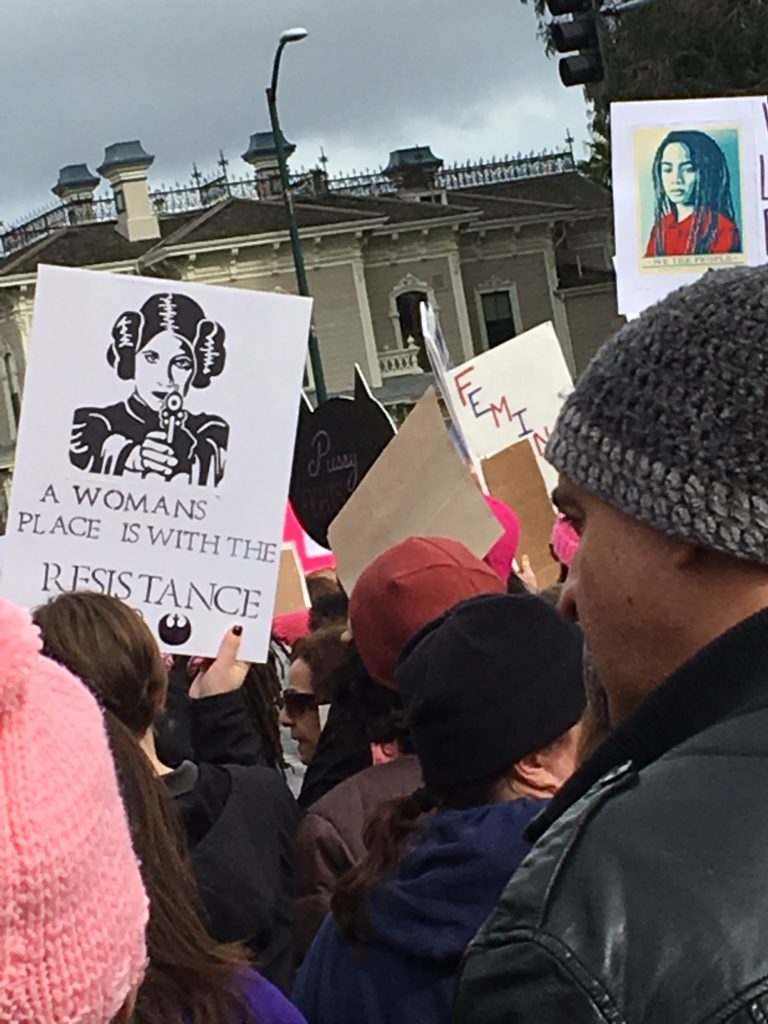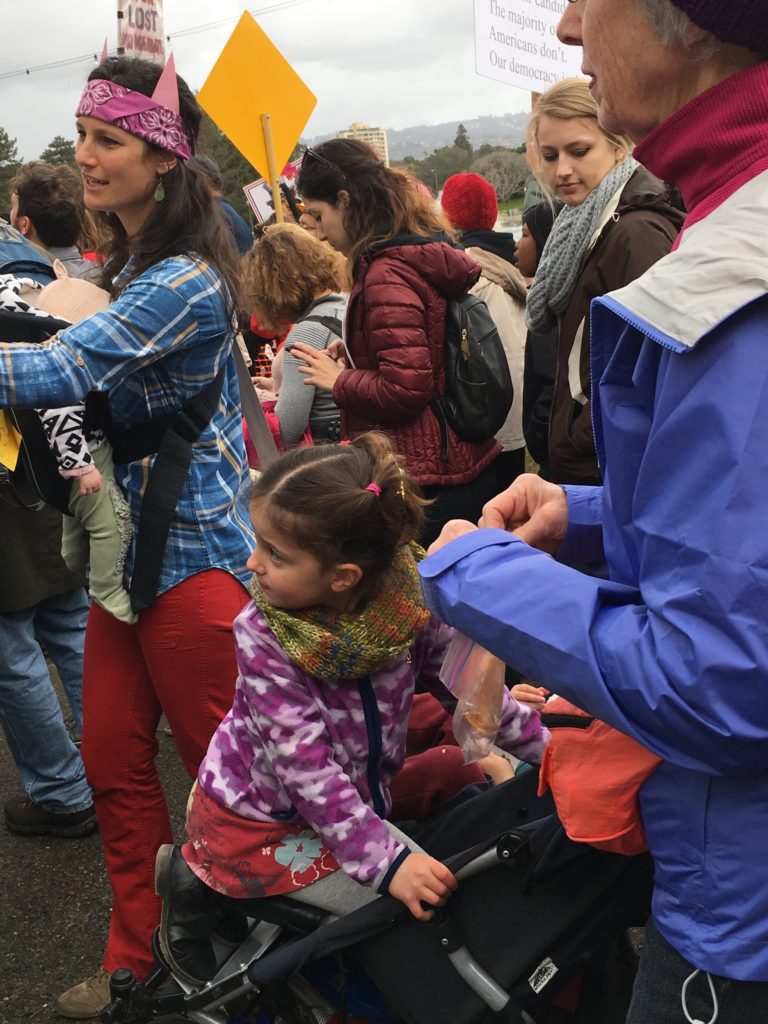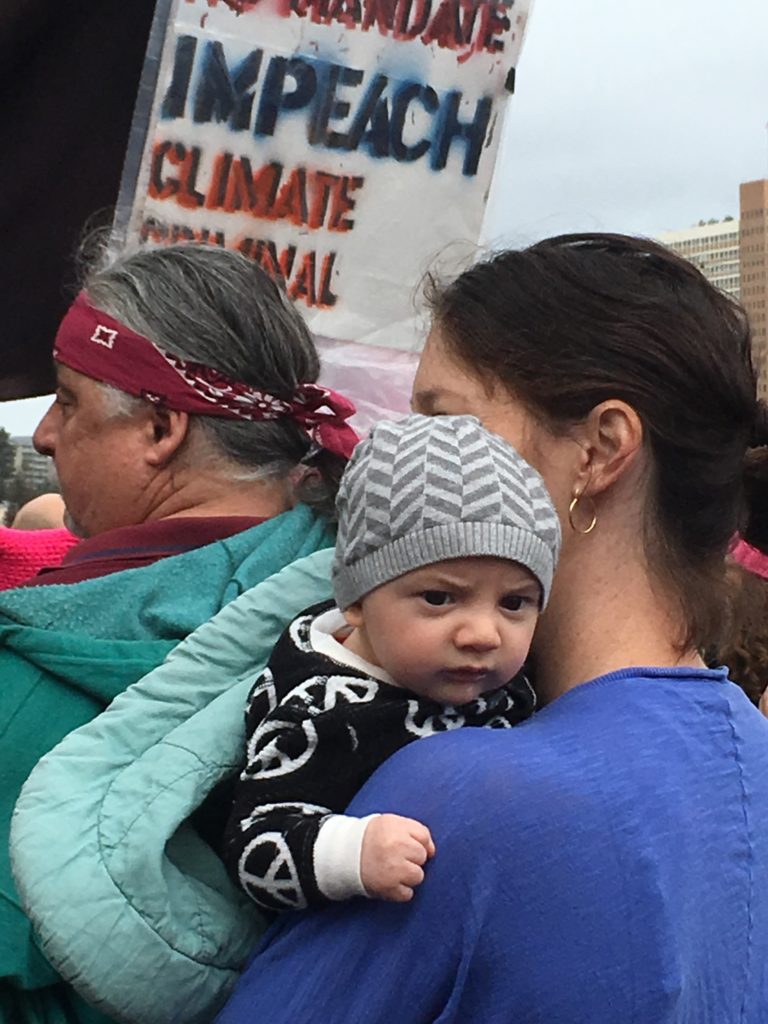|
|
February 7, 2017
 We are marching for the right to be heard and listened to. If you’ve watched anti-Trump protests in the news or seen people marching in the streets in your own community, your kids have probably taken notice. Maybe they’ve already asked you, “What are those people doing?”
No matter who you voted for, the first thing everyone who respects our Constitution ought to tell kids is that protestors have the right to protest. The First Amendment prohibits Congress from enacting any law that restricts the people’s right to peacefully assemble. And the Fourteenth Amendment makes that right applicable to state governments. Nearly all fifty states include that right in their state constitutions. If you know which ones don’t, please tell me. We can work with them.
So, there’s the first piece about talking to kids: U.S. citizens are guaranteed the right to peacefully 1) parade and gather or 2) demonstrate support or opposition of public policy or 3) express one’s views. These are guaranteed by the freedom of speech and the right to peaceably assemble.
If your child asks, “What are they marching against?” You might frame your answer this way, “They’re marching for the right to be heard. You see, sweetie, our form of government is a democracy. Democracies stay healthy when we tell our elected representatives how we feel about the choices they’re making in our name. Voting is one way of talking to our representatives on the local, state and federal levels… all the way up to the White House. But voting doesn’t happen very often. That’s why we it’s very important we’ve got other ways to communicate with our representatives, through email, phone calls and peaceful protest.”
Our kids should learn from us that making our voices heard is a good thing. So is direct civic and political engagement. That’s a family value we can all embrace. Tell them that democracy is like a garden. If you ignore it, it will become overrun with weeds, but if you tend it and stay alert and actively involved, it will thrive.
Whether or not your beliefs align with the protestors, use the demonstrations as springboards for ongoing conversations about your family values. Either way, celebrate the fact that our country’s government protects people who protest peacefully. Let your kids know that’s a very cool thing and not every country does it.
And remember, elected officials are temps. We, the people, are here for good. If we want our country to reflect our values, including really important ones like how we treat other people and how we care for the Earth, then we need to fight for those values. And march in the street, if necessary.

January 23, 2017
 Look around, little sister. You are one of us. When girls see women marching together, proud and peaceful, focused and determined, politically motivated and ready for action, those girls might realize something they had not known—something about women and something about themselves as girls.
When girls see women marching in solidarity for women’s rights and human rights, a seed is planted. One that will help girls recognize:
Women are beautiful. Each of us, in all our infinite diversity. Look at the images from women’s marches around the globe. Look at our faces. Look at our bodies. Look at our shining eyes. Look at our mouths shouting, chanting, singing, making our voices heard. Face it. Our beauty is undeniable. Face yourself. You are beautiful. Stop starving yourself. Not to fit into skinny jeans or someone else’s idea of “perfection.” Stop trashing your body with insults. Stop trashing other girls. Just stop. Love your body. Girl, you are beautiful.
Women are powerful. We don’t need anyone’s approval to be who we are. Getting approval is not why we’re here. We don’t need a boyfriend/girlfriend/partner/spouse to complete us. What you see is what you get—an already complete package. Be clear about that. Be clear, also, that no one has the right to touch us without our permission. No one has the right to objectify us or make us feel small or scared. No one has the right to make laws that govern our reproductive rights. Being pretty and sexy and nice and cooperative is not why we’re here. We are here to use our power for good. Each of us, on our own, has the power to shift any conversation, any relationship, any situation just by being focused, honest, and assertive. That’s power. Girl, you are powerful.
We are sisters. There is no “natural competition” between women. Some male marketers made that up to get you to buy more beauty products. What is natural is our connection with and our empathy for each other. We are sisters. To be unkind to another woman, to another girl, is to be unkind to yourself. We need each other’s understanding and support. We are sisters.
We have a caring heart. We are upholders of humanity’s highest value and greatest asset: a caring heart. Our mammalian brain is wired for empathy, to feel the full range of human experience whether it’s our own experience or someone else’s. Do not deny what you feel. Do not let anyone scoff at your tenderness and tell you you’re “too emotional.” Our emotions make us fully human. To deny our emotions is unhealthy. It can also desensitize us to the needs of others. A woman’s power comes, in part, from her caring heart. You have that heart.
We get things done. We are doers. We are organizers. What you feel is important, but what you do is more important. When we work together, with clarity of purpose, with respect for our individual strengths and compassion for our limitations, we are unstoppable. We are women.
The Women’s March was a spectacular beginning. It was the first step. Here’s what’s next.

January 22, 2017
 All together now. Saturday, January 21, 2017– Millions of women and men on all seven continents (including Antarctica) marched in solidarity for women’s rights and the rights of all people to live in peace, to determine their own destiny, and to be treated with fairness, dignity and respect by their neighbors and their government. It was also Trump’s first full day on the job as President of these United Divided States of Anxiety.
Dark times since the election. Every day we see more evidence of the absurd charade trying to pass for leadership in Congress and now in the Oval Office. Scary stuff.
But yesterday I sang Here Comes the Sun as I took to the streets in Oakland with my husband, our daughter, and 100,000 of my sisters and brothers. We were all there, together, because staying silent in the face of what’s happening is just not an option. I needed to be reminded in a way that no #alternativefacts can negate, that we, the people, get to decide who we are, as Americans, as human beings. Trump and his gang of sycophants and patrons don’t get to decide that.
 How to be the change? Step 1: Show up. #WomensMarch Oakland, CA

January 9, 2017
 “When the powerful use their position to bully others, we all lose.” At Sunday night’s Golden Globes, actress Meryl Streep was honored with the Cecil B. DeMille Award for lifetime achievement. Her acceptance speech honored and encouraged all of us who try to be mindful of the dignity and respect we owe our fellow humans. If you haven’t yet watched that speech, it’s only about 6 minutes. Well worth your time. The crux of it: Use your power for good.
Without mentioning the President-elect by name, Ms. Streep said,
“…when the person asking to sit in the most respected seat in our country imitated a disabled reporter, someone he outranked in privilege, power, and the capacity to fight back. It kind of broke my heart when I saw it. I still can’t get it out of my head because it wasn’t in a movie. It was real life.
And this instinct to humiliate, when it’s modeled by someone in the public platform, by someone powerful, it filters down into everybody’s life, because it kind of gives permission for other people to do the same thing. Disrespect invites disrespect. Violence incites violence. When the powerful use their position to bully others, we all lose.”
This chapter we’ve entered isn’t about politics. Though some argue that everything is political. Perhaps. But most of us parents don’t think about politics as we raise our children. We think about the basics of the job at hand. Food. Shelter. Economic and emotional security. Education. And if we are fortunate enough to have those boxes checked, we can begin to think about the kind of people we want our children to grow up to be. We think about how they will treat others. What kind of friends and partners they will become. We think (and often worry) about how others will treat our children.
We try to be positive role models for our children and for all children. In this time and place where hate speech and duplicity are becoming normalized, we must redouble our efforts. When we see disrespectful behavior we must speak out against it. We must teach our children to speak out against it. To do otherwise encourages more disrespect and hate and violence. Make no mistake, polite silence is not an option. It never was. Neither is exasperated head-shaking. If we are to be teachers worthy of our children, committed to creating a saner, safer world for them, then we must actively push back against the growing normalization of hate. In the absence of moral leadership, each of us must lead.

| |
















